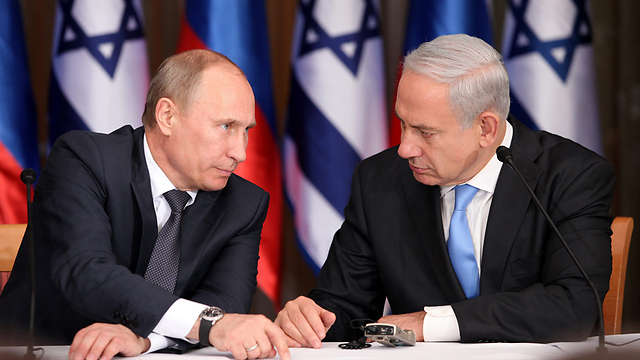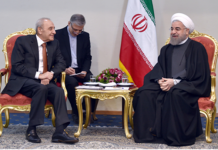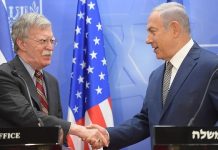Opinion/Trump’s Appalling Display in Helsinki Shows Netanyahu Was Right All Along to Invest in Putin
دانيال شابيرو في الهآررتس: عرض ترامب المروع في هلسنكي يظهر أن نتنياهو كان على حق في مراهنته على بوتين
Daniel B. Shapiro/Haaretz/July 17/18
Israel is prepared for the post-Helsinki reality: With Trump so beholden to Putin, for whatever reasons, Russia alone is calling the shots in Syria – and alone will decide whether to take Israel’s interests into account.
You’re Israel. You count on the United States as your chief ally and supporter in the world. When the United States is strong and respected, it adds luster to Israel’s own impressive abilities to defend its interests and its security.
And then you witness the President of the United States in a joint press conference with the President of Russia, promoting Russian interests, adopting Russian narratives, and wholly unable or unwilling to defend the United States against a major attack. And your head spins.
Not everything Israel heard in Helsinki was negative. Not by a long shot. Both U.S. President Donald Trump and Russian President Vladimir Putin spoke plainly about the importance of Israel’s security, and their desire to ensure that Israel is not harmed by events in Syria.
There is no doubt that President Trump is genuine in his commitment to Israel’s security. And Putin himself, wily though he may be, seems to take Israel’s security concerns seriously.
Israel’s Prime Minister Benjamin Netanyahu has to be given considerable credit for his ability to maintain a respectful dialogue with Putin over the past three years, enabling Putin to understand Israel’s security red lines in Syria and its determination to enforce them.
When Russia deployed its military to Syria in 2015, and the Israel-Russia dialogue began in earnest, I was still serving as U.S. Ambassador to Israel. I occasionally received inquiries from colleagues in Washington, some puzzled, others irritated, asking why Netanyahu was “cozying up” to Putin at a time when Russia was killing Syrian civilians and engaging in aggression against Ukraine.
My answer was quite simple: Israel is a small regional power, and all of a sudden, it found that it had a superpower operating in its backyard. Under such circumstances, Israel had no choice but to develop and sustain a productive dialogue with Russia, to ensure that Russia would not do harm to Israel’s security or curtail its freedom of action, as it surely could if it wanted to.
I assured by colleagues that Netanyahu was not the least bit naive about who Putin was, and that the relationship he was building was utilitarian in nature, ensuring Israel would be able to act to defend its security in Syria. No more, no less.
I still believe that today. But the atmosphere in which Israel must navigate its superpower relationships is changing dramatically.
Following Helsinki, it is unmistakable that we are experiencing something unprecedented: a U.S. president who identifies more closely with Russian interests and promotes Russian narratives than with those of the United States. The leverage that gives Putin is overwhelming.
Putin must think he died and went to heaven.
There is room for criticism of previous administrations’ handling of Russian affairs. President George W. Bush vouched for Putin after looking into his eyes and “getting a sense of his soul” and was unable to prevent Russian aggression against Georgia. President Obama, after some success improving relations during the Presidency of Dmitry Medvedev, was similarly stymied by Russia’s illegal annexation of Crimea and aggression in Eastern Ukraine, and found it difficult to counter Russia’s dominant intervention in support of Assad’s regime in Syria.
But there is a qualitative difference between those two administrations’ approach, which struggled to find tools to counter Russian actions against U.S. interests, and President Trump’s, which wholeheartedly embraces long-held Russian goals, like the dismantling of NATO or the break-up of the European Union.
Most clearly, whereas Obama confronted Putin about Russia’s interference in the U.S. elections, and imposed sanctions after U.S. intelligence agencies confirmed the charges, Trump is determined to dismiss the issue out of hand. In Helsinki, in an appalling display, he made clear that he accepted Putin’s ludicrous denials over the consensus, and recently reiterated, views of his top intelligence officials.
Game, set, and match to Putin.
None of this is primarily Israel’s problem. Israel understandably prioritizes the outcomes of the Helsinki summit that can most directly affect its security, chiefly relating to Iran and Syria. Netanyahu met with Putin in Moscow last week and spoke to Trump over the weekend to ensure Israel’s views were taken into account. He dutifully expressed appreciation to both leaders for their supportive words spoken at the press conference.
It is not known what Putin and Trump discussed in their private meeting. But in the joint press conference, there was little offered on Iran, and only general expressions of a desire to cooperate on bringing stability to Syria, with no mention of the expulsion of Iranian troops and an absurd description of Russia as the protector of Syrian civilians.
Unless there were more detailed secret understandings, Israel will have much more work ahead to ensure its interests are protected. From what we know so far, the Helsinki discussions will likely lead to continued suffering of the Syrian people, and continued threats against Israel by Iranian forces.
But in the light of the post-Helsinki dawn, Israel must also adjust to the reality that Russia alone is calling the shots, and the United States looks diminished as an ally. Trump has shown himself to be so beholden to Putin, for whatever reasons, that it is nearly impossible to imagine him asserting a separate U.S. policy on Syria.
He may yet go further, following through on his expressed desire to remove the 2,000 U.S. forces who support operations to complete the counter-ISIS campaign, over Israeli objections.
But regardless of the U.S. approach, what Helsinki confirmed is that Netanyahu was right all along to invest in his relationship with Putin. More than he knew.
For what he could not have envisioned was the neutering of the United States as a partner on the same set of issues, through its president’s adoption of Russian interests as his own.
**Daniel B. Shapiro is Distinguished Visiting Fellow at the Institute for National Security Studies in Tel Aviv. He served as U.S. Ambassador to Israel, and Senior Director for the Middle East and North Africa, in the Obama Administration. Twitter: @DanielBShapiro























